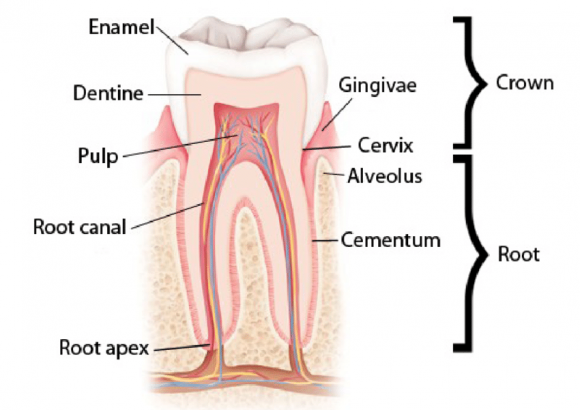Teeth sensitivity describes the pain or discomfort you feel in the teeth as a response to certain stimuli, such as hot or cold temperatures, exposure to cold air and even brushing your teeth.
Causes of teeth sensitivity
Sensitive teeth are primarily the result of worn tooth enamel or exposed tooth roots. That said, it may be caused by other factors which include:
- a cavity (tooth decay)
- a cracked or chipped tooth
- a worn filling
- gum recession/gum disease
Well, before discussing how enamel erosion can lead to teeth sensitivity – let’s understand the composition of a human tooth.

Your tooth consists of the crown (the visible part of the tooth), and the root (anchors each tooth into your jaw). These make up the crown:
- Tooth enamel – The hard, white-looking layer that protects the sensitive inner parts of each tooth. Studies have proven that tooth enamel is the hardest material in the human body – even stronger than bone.
- Cementum – A thin, protective layer of bone-like tissue under the gum line that protects the tooth root.
- Dentin – A layer of softer tissue that contains tiny canals or ‘tubules’.
- Pulp – The soft tissue deep inside each tooth that contains blood vessels, connective tissue, and nerves.
Enamel erosion and sensitivity
97% of the enamel is hydroxyapatite, the mineralized form of calcium phosphate.
In as much as tooth enamel is the hardest material in the human body, it can wear away. And when it does, your tooth’s dentin is exposed. This exposure causes nerve signals to pass to the tooth root and later to the brain – thus teeth sensitivity.
Enamel erosion is easily aided by:
- Poor oral hygiene
- Brushing your teeth too hard
- Regular eating or snacking on acidic foods, such as soda
- Improper teeth whitening that is not supervised by a dental health professional
- Dry mouth, due to alcohol intake or some medications
- Grinding teeth (bruxism)
- Decay activity
Tooth decay, broken teeth, chipped teeth, and worn-down fillings or crowns can also leave the dentin of the tooth exposed, causing sensitivity. When this happens, the sensitivity will likely be limited to the particular tooth/teeth.
As mentioned earlier, gum recession can also lead to sensitivity. Causes of gum recession include:
- Using a hard-bristled toothbrush – This can injure the gum tissue.
- Gum disease – A common oral health disease that can cause receding gums.
- Genes – Regardless of how you care for your teeth, you may be genetically susceptible to gum recession.
- Smoking – Tobacco products increase plaque build-up on teeth which over time can lead to a greater risk of gum recession.
It’s important to highlight that teeth sensitivity can also be felt after dental work. It could be after teeth cleaning, bleaching, or getting a filling. This should disappear a few days after the procedure is done.
Are you experiencing tooth sensitivity? Make an appointment with our dentists for review, proper consultation, and treatment where necessary.


Leave a Reply